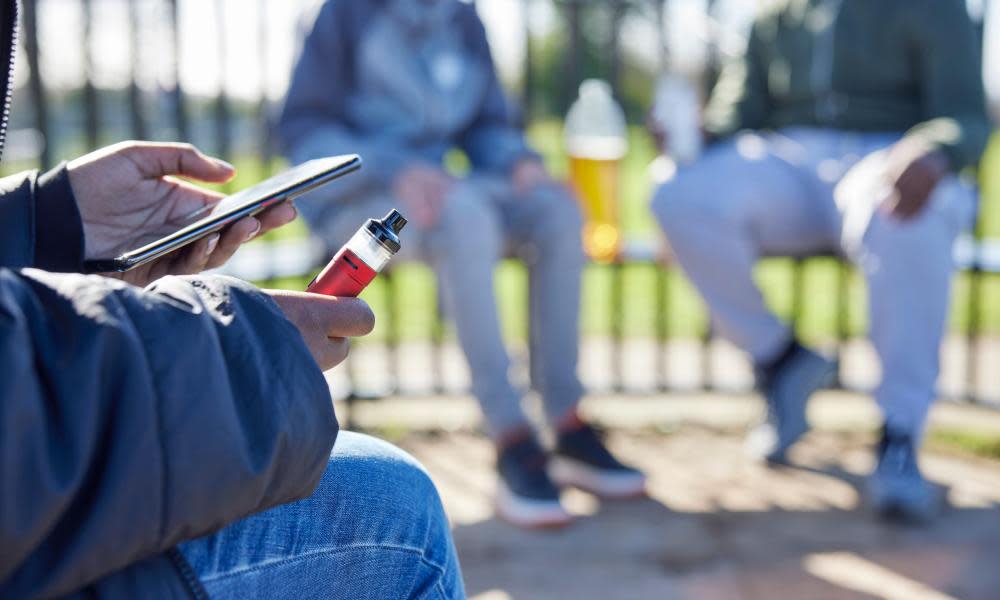Ministers plan to ban retailers in England from giving children free vapes

Retailers will no longer be able to hand out free samples of vapes to children after ministers announced plans to close a legal loophole.
Although it is illegal to sell e-cigarettes to under-18s, it is not illegal for retailers and marketing firms to hand out free samples. This is because vapes are not covered by the tobacco advertising rules prohibiting free distribution, as they are not considered a tobacco product.
It has been nearly three years since campaigners sounded the alarm at the “gaping hole” in e-cigarette regulations in England, which they warned could result in more children vaping.
Campaigners and doctors have also urged the government to urgently toughen rules around the advertising and packaging of vapes, which target children with bright colours, fruity flavours and cheap disposable options.
The government announced its plan to close the loophole as part of a wider package of efforts to tackle child vaping, which doctors fear could result in long-term addictions and lung damage. NHS figures for 2021 show that 9% of 11- to 15-year-old children used e-cigarettes, up from 6% in 2018.
The prime minister, Rishi Sunak, said he was “deeply concerned” about the sharp rise in children vaping and shocked by recent reports that some young people have obtained illicit vapes containing lead.
He said: “The marketing and the illegal sales of vapes to children is completely unacceptable and I will do everything in my power to end this practice for good.”
Deborah Arnott, chief executive of Action on Smoking Health (Ash), warned that the proposals were “baby steps not the tough action that’s needed”.
She said surveys show that the growth in youth vaping is primarily due to cheap disposables costing as little as £1.99. Ash called for the government to put an excise tax on single-use vapes in the spring budget, without success.
She said adding £5 to single-use vapes would make them less appealing as children are “very price sensitive”, and would give the government greater powers to control their import, helping limit an “out of control” illegal vapes market.
She noted that in 2021 the government refused amendments to the health and social care bill enabling ministers to regulate branding and prohibit the free distribution of vapes.
“If those powers were in place today action could be taken now without further delay. This initial announcement must be quickly followed by more detailed action when the government’s current call for evidence on vaping closes next week,” she said.
Related: Is vaping safe or not? All you need to know about e-cigarettes
Wes Streeting, the shadow health secretary, said action was needed “to stop a new generation of kids getting hooked on nicotine”. “But the Conservatives voted down Labour’s plan to ban the marketing of vapes to children,” he said. “The next Labour government will come down like a ton of bricks on those pushing vapes to kids.”
Earlier this week Sunak revealed he was concerned about the impact that the marketing of vapes could have on his two young daughters. “We’re looking at how can we strengthen the rules on how are they marketed, promoted, what do they look like. It looks like they are targeted at kids, [which is] ridiculous. I don’t want my kids seduced by any of these things,” he told ITV’s This Morning programme.
The government is also reviewing banning retailers selling nicotine-free vapes to under-18s, and how it can make it easier for local Trading Standards to issue on the spot fines and fixed-penalty notices to shops selling vapes to children.
The Chartered Trading Standards Institute said the “wild west” of illegal vape sales were the biggest enforcement issue on the high street after its teams reported a significant rise in underage sales last year.
The health risks of vaping will be also be included in Relationships, Sex and Health Education (RSHE) lessons. This include a lesson for 11- to 13-year-olds on how young people’s developing brains may be more sensitive to nicotine.

 Yahoo News
Yahoo News 
